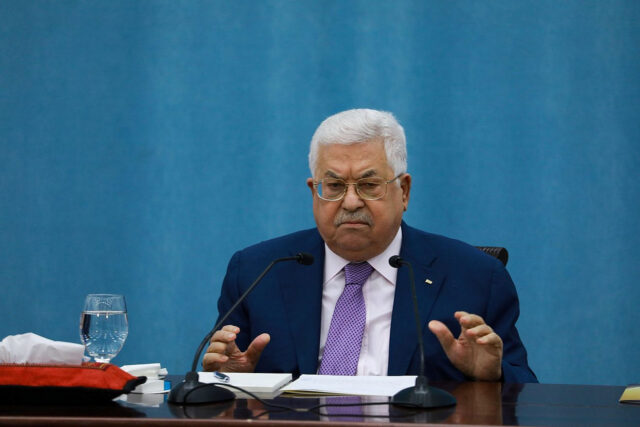
Israel’s top security officials were recently in Washington, D.C. to meet with high-level Biden administration officials. According to the Israeli newspaper Haaretz, the meetings were not about Israel’s security or the increasing regional threat posed by Iran.
“The Biden administration is mainly concerned over the Palestinian Authority’s diminished standing, particularly its loss of control over several cities in the northern West Bank, which have become strongholds for rival Palestinian militant groups,” Haaretz reported.
CIA Director William Burns, who met with Israel’s Shin Bet chief, said the latest developments reminded him of the eve of the second intifada.
First, U.S. officials are talking to the wrong party. Second, Burns is wrong.
The 2001 Palestinian war against Jews that killed more than 1,000 Israelis—proportionately, this would be 40,000 American dead—was a result of then-P.A. leader Yasser Arafat’s inability to meet the terms of the Oslo Accords.
Today’s war is a continuation of the Palestinian civil war that began in 2007, with competing militias like the Iranian-supported Palestinian Islamic Jihad (PIJ) and Hamas. This war now includes many Palestinians unhappy with the greed and repression of the P.A.
It is clear that P.A. chief Mahmoud Abbas is thoroughly incapable of defending his government and people. So, he is looking to Israel to save him and his regime.
On the principal “better the P.A. than Iran,” the IDF has been working overtime in Judea and Samaria for the past few months, waging war against the enemies of Abbas. This included breaking up the Lion’s Den militia in Nablus, which opposes the P.A. and in April announced the execution of a Palestinian for collaborating with Israel. Israel also seriously set back PIJ in the spring and has attacked Hamas.
But the long-term trends are bad for Abbas.
During the May 2021 Hamas rocket war against Israel, the Associated Press reported that thousands of Hamas supporters demonstrated against Abbas in Judea and Samaria for the first time, chanting, “Dogs of the Palestinian Authority, out, out.” Hamas members were also seen victory dancing in Gaza.
In April 2022, Hamas flags flew above the Al-Aqsa mosque during Ramadan.
In a little-noticed move, in Sept. 2022, IDF Chief of Staff Aviv Kochavi approved Israeli drone strikes in Judea and Samaria. While Israel was denounced by the usual cast of characters, the drones were used against Iran-supported militias including PIJ, which led the rocket war against Israel only weeks ago.
During Ramadan 2023, Hamas engaged in violence inside and outside the Al-Aqsa mosque on the Temple Mount.
If the Biden administration really understood the rising threats to P.A. governance and the increase in Iranian-supplied weapons in Judea and Samaria, maybe it would understand that Israel’s idea to have more Israelis—more IDF, more security—in Samaria is a good idea.
Maybe they would understand that slamming Israel’s plans for the settlement of Homesh was a bad idea.
Speaking of bad ideas, the administration is planning to supply funds to the P.A. in defiance of the bipartisan Taylor Force Act that forbids such funding as long as the P.A. pays “salaries” and “stipends” to terrorists and their families for killing Jews.
According to a statement from the White House, U.S. National Security Advisor Jake Sullivan “stressed the need to take additional steps to improve the lives of Palestinians, critical to realizing a more peaceful, prosperous and integrated region.”
The U.N. has recently warned of a “humanitarian crisis in the Gaza Strip, which could also deteriorate into a violent Palestinians escalation,” Haaretz reported.
This, Mr. Sullivan, is not a conversation to have with Israeli security personnel. It is a conversation to have with the Palestinian leadership, such as it is. Money will not moderate Palestinian behavior any more than it moderates the behavior of Iran.
Abbas’s personal wealth has been estimated as high as $100 million. He says no, just $10 million. That’s still a lot. Where did it come from?
To understand Gaza, follow @Imshin on Twitter to see how the Hamas elites live in “poor Gaza” with luxury accommodations, restaurants, riding stables for their children and more.
Why isn’t that money spent on the poor people Hamas uses as human shields? Maybe Saudi Arabia asked that question before it cut funding for the P.A. by more than 80%.
According to Haaretz, American officials have “expressed fears that violent escalation is on the horizon.” They’re late. The violent escalation—against Abbas and Abbas’s escalation against Israel—has already arrived.
Israel’s obligation is to protect its people, not to be Abbas’s Praetorian Guard.





